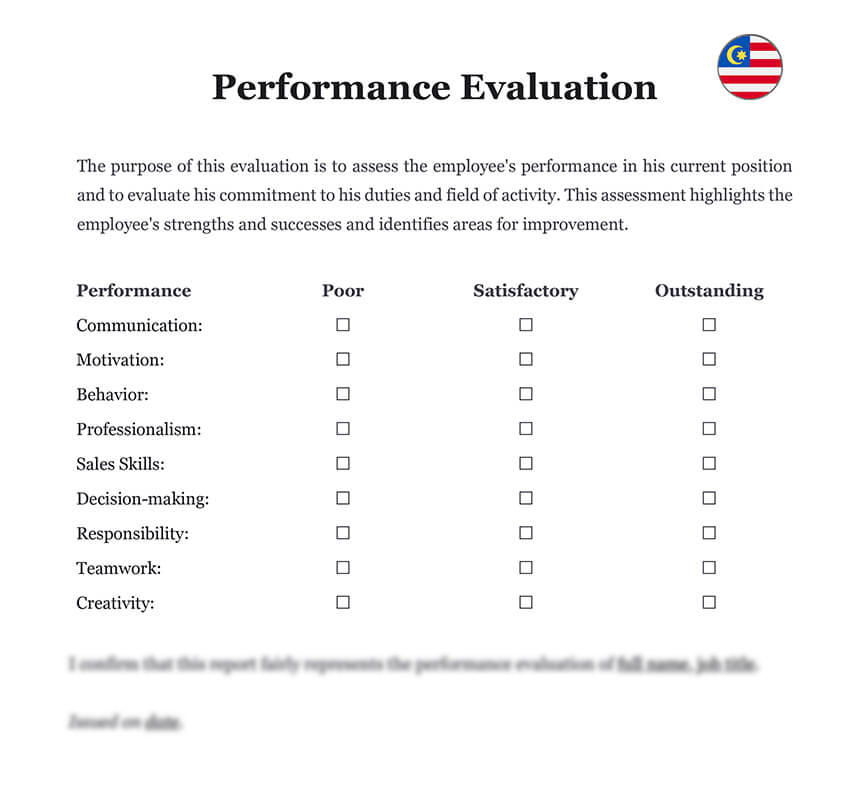Ready to use legal template
Work on without any hassle
Compliant with Hong Kong law
Ready to use legal template
Work on without any hassle
Compliant with Hong Kong law
Learn more about Employee Performance Evaluation in Hong Kong
An Employee Performance Evaluation is a structured assessment process used by employers to review and measure an employee’s job performance, productivity, and contributions to the company. It helps organizations identify strengths, areas for improvement, and opportunities for career growth while ensuring alignment with company goals. In Hong Kong, performance evaluations play a crucial role in employment decisions, including promotions, salary adjustments, and contract renewals, while also helping businesses comply with fair employment practices. A well-documented evaluation process promotes transparency, accountability, and a productive work environment. Employers should conduct performance reviews regularly and in accordance with Hong Kong’s labor laws to avoid disputes. To simplify this process, download our Employee Performance Evaluation template, professionally drafted, easy to edit in Word format, and designed to meet the needs of businesses operating in Hong Kong.
Table of contents
-
What is an Employee Performance Evaluation in Hong Kong?
-
What is included in this Employee Performance Evaluation?
-
How often should a Performance Evaluation be conducted?
-
What criteria are used in an Employee Performance Review?
-
Can an Employee Performance Evaluation affect salary or promotions?
-
What should employees do if they disagree with their Performance Review?
-
Is an Employee Performance Evaluation required by Hong Kong labor laws?
-
How can employers ensure a fair and unbiased Performance Evaluation?
-
What are the best practices for conducting an effective Performance Review?
What is an Employee Performance Evaluation in Hong Kong?
An Employee Performance Evaluation is a structured method used by employers to review an employee’s work, skills, and progress over a defined period. In Hong Kong, regular evaluations are vital for aligning employee goals with business objectives and ensuring workforce productivity. These assessments help employers make decisions regarding promotions, bonuses, and training needs. A fair and transparent evaluation process also supports compliance with equal opportunity standards under Hong Kong labor regulations. It fosters open communication between employees and management, promoting continuous improvement. Documentation of evaluations is important for future reference and legal clarity.
What is included in this Employee Performance Evaluation?
An Employee Performance Evaluation is a structured document that generally contains the following key components:
| ➤ Purpose of Evaluation: This section clearly outlines the reason for conducting the evaluation, which is to assess the employee’s performance, identify strengths, and pinpoint areas where improvements are needed. |
| ➤ Evaluation Criteria: The evaluation assesses various performance metrics, which may include communication skills, motivation, teamwork, professionalism, decision-making abilities, and technical skills relevant to the role. |
| ➤ Performance Rating: This section provides a structured system to rate the employee’s performance, typically using categories such as poor, satisfactory, and outstanding, allowing for clear differentiation of the employee’s competencies. |
| ➤ Feedback on Strengths: Positive feedback highlights the employee’s achievements, skills, and contributions that add value to the company, helping boost morale and motivation. |
| ➤ Areas for Improvement: Constructive criticism is provided in this section to identify any areas where the employee could enhance their performance or skills, enabling them to meet the company’s expectations more effectively. |
| ➤ Employer’s Confirmation: This part acknowledges that the evaluation has been conducted fairly, transparently, and in line with company policy. |
| ➤ Employee Acknowledgment (if applicable): In some cases, employees are asked to review the evaluation and provide their acknowledgment or comments, ensuring that both parties are on the same page regarding the assessment. |
| ➤ Confidentiality: Ensures that the evaluation remains confidential and is shared only with relevant parties, maintaining privacy and professional standards. |
| ➤ Follow-up Actions: If necessary, this section outlines the next steps, such as training opportunities, skill development plans, or performance improvement strategies. |
How often should a Performance Evaluation be conducted?
1. Frequency of Performance Evaluations
The frequency of performance evaluations is generally determined by company policies and the specific requirements of the job. In many organizations, evaluations are conducted annually or bi-annually. However, companies in fast-moving industries might conduct quarterly reviews to ensure employees stay on track and meet their goals. Regular evaluations help identify potential issues early, enabling timely interventions to improve performance. New hires often undergo probationary reviews within the first 3 to 6 months to assess their suitability for the role.
2. Benefits of Regular Performance Reviews
Frequent performance evaluations contribute to employee growth by highlighting strengths and areas for improvement. They provide a structured platform for feedback and goal setting. This process helps ensure that employees are aligned with company objectives and enhances overall productivity. Furthermore, performance reviews play a crucial role in fostering employee engagement and motivation by recognizing achievements and offering constructive feedback. To learn more about performance review best practices, visit the Hong Kong Labour Department.
What criteria are used in an Employee Performance Review?
Employee performance reviews typically assess a variety of factors that reflect the employee’s effectiveness in their role. Common criteria include:
| ➤ Communication Skills: The ability to clearly express ideas, both in writing and verbally, and to listen effectively. |
| ➤ Motivation and Initiative: The employee’s drive to perform their duties proactively, seek challenges, and take ownership of tasks. |
| ➤ Teamwork: How well the employee collaborates with others, contributes to team efforts, and supports colleagues. |
| ➤ Professionalism: The employee’s ability to maintain a professional demeanor, demonstrate reliability, and adhere to workplace standards. |
| ➤ Decision-Making: How well the employee can make informed decisions, particularly under pressure or with limited information. |
| ➤ Job-Specific Skills: Technical or industry-specific skills that are necessary for the employee to perform effectively in their role. |
| ➤ Customized Criteria: These criteria are customized based on the job description and expectations of each specific role within the company. |
- Remarks:
It’s important that the criteria for performance evaluations are tailored to each role and remain consistent. Using outdated or irrelevant metrics may result in inaccurate assessments. Employers should regularly review and update the evaluation criteria to reflect the evolving needs of the business.
Can an Employee Performance Evaluation affect salary or promotions?
1. Impact of Performance Evaluations on Salary and Promotions
Employee performance evaluations can significantly influence salary increases and promotion opportunities within a company. Positive evaluations often serve as a foundation for salary hikes, bonuses, or advancement to higher positions. Conversely, subpar performance reviews may result in the employee being ineligible for raises or promotions until they address areas of improvement highlighted during the review process. Clear communication from employers on how performance impacts salary and promotions is essential to ensure fairness and transparency in the workplace.
2. Career Development Opportunities Based on Performance
Employees who consistently perform well in evaluations are often rewarded with greater responsibilities, leadership roles, or promotions. These opportunities help retain top talent and show that the organization values high performance. In Hong Kong, linking performance results to career growth is a best practice that fosters employee engagement and long-term commitment. Employers should ensure that these rewards are based on objective criteria and transparent evaluation processes. Providing clear feedback and development plans also helps employees improve and grow. Regular evaluations thus serve as both a performance management and talent development tool.
ℹ️ The Employee Handbook outlines the company’s policies on performance evaluations, providing clear guidelines for employees and employers to follow
What should employees do if they disagree with their Performance Review?
1. Addressing Disagreements Over Performance Evaluations
If an employee disagrees with their performance evaluation, they should first request a private meeting with their manager or supervisor. It is crucial for the employee to approach the discussion professionally, providing clear examples or evidence to support their viewpoint. The goal is to express concerns calmly and constructively, fostering an open dialogue. This approach helps to ensure that both sides are heard, which can lead to a fair resolution. The employer should be open to listening and may need to reconsider or adjust the evaluation based on the discussion.
2. Resolving Conflicts Through Open Communication
Employers must take employee concerns seriously and carefully assess whether the evaluation was accurate and fair. If necessary, the employer may amend the evaluation or offer the employee a performance improvement plan. Transparent communication helps resolve conflicts and aligns both the employer’s and employee’s expectations moving forward. This process ensures that the employee feels heard and understood while maintaining the integrity of the performance evaluation system. For further guidance, refer to the Hong Kong Labour Department.
ℹ️ During the Employee Probation Period Termination, an employee’s performance is assessed, and the results may lead to termination if the expectations outlined in the performance review are not met.
Is an Employee Performance Evaluation required by Hong Kong labor laws?
1. Importance of Performance Evaluations
Although Hong Kong’s Employment Ordinance does not mandate regular performance evaluations, it is highly recommended as a good business practice. Conducting regular evaluations helps employers make informed decisions on promotions, salary increases, and terminations. These evaluations ensure that the employer’s actions are based on objective criteria, minimizing the risk of bias or discrimination. Additionally, a well-documented evaluation process can provide clear evidence if performance-related decisions are challenged legally. Employers should ensure that evaluations are done fairly and consistently.
2. Ensuring Compliance with Anti-Discrimination Laws
Performance evaluations can be crucial in demonstrating compliance with Hong Kong’s anti-discrimination laws. When making employment decisions based on performance, employers should ensure that they are not influenced by discriminatory factors such as race, gender, or age. A transparent evaluation process allows employers to justify their decisions and protect themselves from claims of unfair dismissal or unequal treatment. To maintain compliance, employers should align their evaluation methods with Hong Kong’s fair employment practices.
How can employers ensure a fair and unbiased Performance Evaluation?
To ensure fairness and avoid bias in performance evaluations, employers can adopt several best practices:
| ➤ Clear Evaluation Criteria: Establish transparent performance metrics and ensure that all employees are evaluated based on the same criteria, tailored to the specific role. |
| ➤ Regular Feedback: Offer continuous feedback throughout the year, rather than relying solely on annual reviews. This ensures that employees are aware of how they are performing and can make adjustments throughout the year. |
| ➤ Objective Data: Use data and measurable outcomes, such as sales figures, project completion rates, or customer satisfaction scores, to support the evaluation. |
| ➤ Involve Multiple Evaluators: Consider having multiple managers or colleagues participate in the evaluation process, particularly in larger organizations, to minimize personal biases. |
| ➤ Training for Evaluators: Train managers and supervisors to conduct performance evaluations fairly, avoiding unconscious biases or favoritism. |
- Remarks:
To prevent bias in performance evaluations, employers should use objective data and ensure consistency across all employees. Training managers on conducting evaluations fairly is crucial for minimizing unconscious bias. Without these measures, the evaluation process could lead to discrimination claims or employee dissatisfaction.
What are the best practices for conducting an effective Performance Review?
1. Preparing for an Effective Performance Review
To conduct an effective performance review, preparation is essential for both managers and employees. Managers should thoroughly review the employee’s performance, gather feedback, and assess measurable achievements. It’s important to focus on objective criteria and offer specific examples of both strengths and areas for improvement. Constructive feedback is key, ensuring it is actionable and relevant to the employee’s development. The review should involve a collaborative discussion, allowing the employee to share their own perspectives. This ensures the review is fair and encourages open communication.
2. Setting Goals and Documenting the Review
During the performance review, setting clear goals for the future is crucial. These goals help the employee understand the expectations and areas they need to focus on for further growth. The review should conclude with a mutual agreement on the action steps to be taken moving forward. It is important to document the review for both the employer and employee’s reference. This written record not only helps track progress but also serves as documentation for any future legal or performance-related concerns.
Conclusion
Employee performance evaluations are a crucial aspect of managing and developing talent within any organization, including in Hong Kong. These evaluations not only provide a clear understanding of an employee’s strengths and areas for improvement, but they also serve as a tool for making informed decisions about promotions, salary adjustments, and career development. Conducting regular and fair evaluations fosters a positive work environment, boosts employee morale, and helps align individual performance with the company’s objectives.cFor employers, implementing a structured, transparent, and unbiased evaluation process ensures compliance with Hong Kong’s labor laws while promoting fairness and accountability. It also helps avoid potential disputes and supports effective employee management. For employees, knowing that their performance is being reviewed in a fair and consistent manner provides an opportunity to receive constructive feedback, address areas for growth, and plan for career progression.
SPECIAL OFFER
HR Pro
15 Document Package
Essential documents for managing employees in Hong Kong
Performance EvaluationTemplate (.docx)
Easy and quick to customize
310 client reviews (4.8/5) ⭐⭐⭐⭐⭐
Share information
Why Themis Partner ?
Make documents forhundreds of purposes
Hundreds of documents
Instant access to our entire library of documents for Hong Kong.
24/7 legal support
Free legal advice from our network of qualified lawyers.
Easily customized
Editable Word documents, unlimited revisions and copies.
Legal and Reliable
Documents written by lawyers that you can use with confidence.




